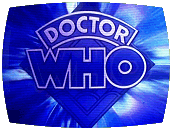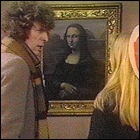 The Doctor and Romana are paying a visit to Paris in 1979 when they both sense an interruption in time. Dismissing it as a freak occurrence, they visit the Louvre, where the Doctor suffers a dizzy spell as the result of another time interference. The Doctor also uncovers a plot to steal the Mona Lisa, attracting the attention of two parties: a bunch of armed thugs working for the obscenely rich Count Scarlioni, and another armed – though less proficient – thug, detective Duggan, who has been trailing Scarlioni on a hunch that the Count plans to lift the painting. Scarlioni’s men kidnap the Doctor, Romana and Duggan to his mansion, where the Doctor realizes that Scarlioni is embarking on hazardous time experiments with technology that couldn’t possibly exist on 20th century Earth. As it turns out, the alien being that calls itself Count Scarlioni is well on his way to stealing the Mona Lisa, but that is merely a diversion, the tip of the iceberg in a plot to revive his extinct alien species…at the cost of erasing the human race from history itself.
The Doctor and Romana are paying a visit to Paris in 1979 when they both sense an interruption in time. Dismissing it as a freak occurrence, they visit the Louvre, where the Doctor suffers a dizzy spell as the result of another time interference. The Doctor also uncovers a plot to steal the Mona Lisa, attracting the attention of two parties: a bunch of armed thugs working for the obscenely rich Count Scarlioni, and another armed – though less proficient – thug, detective Duggan, who has been trailing Scarlioni on a hunch that the Count plans to lift the painting. Scarlioni’s men kidnap the Doctor, Romana and Duggan to his mansion, where the Doctor realizes that Scarlioni is embarking on hazardous time experiments with technology that couldn’t possibly exist on 20th century Earth. As it turns out, the alien being that calls itself Count Scarlioni is well on his way to stealing the Mona Lisa, but that is merely a diversion, the tip of the iceberg in a plot to revive his extinct alien species…at the cost of erasing the human race from history itself.
written by David Agnew (a.k.a. Douglas Adams & Graham Williams)
directed by Michael Hayes
music by Dudley SimpsonGuest Cast: Julian Glover (Scaroth/Count Scarlioni/Captain Tancredi), Catherine Schell (Countess Scarlioni), Tom Chadbon (Duggan), David Graham (Professor Kerensky), Kevin Flood (Hermann), Peter Halliday (Soldier), Pamela Stirling (Louvre Guide), John Cleese, Eleanor Bron (Gallery visitors)
Broadcast from September 29 through October 20, 1979
LogBook entry & review by Earl Green
Review: Easily my favorite Doctor Who story of Tom Baker’s seven-year reign in the part, this is an immensely clever and well-thought-out time travel story that misleads the viewer into thinking that it will concern itself with nothing more than the theft of the Mona Lisa. The best aspect of this four-parter is the witty, verbose script by Douglas Adams, written the same year as the original Hitchhiker’s Guide To The Galaxy radio series which brought him international fame. No word is too obscure or too multisyllabic and the actors carry it off beautifully, visibly delighted to be working with the material at hand. Tom Chadbon is the perfect choice for Duggan, the bumbling Bogart-wanna-be whose main contribution to human history comes in the form of a right hook. Another excellent addition to the cast is veteran actor Julian Glover, who adds just the right menacingly charming touch to Count Scarlioni (but also hams it up a bit too much in the role of one of Scarlioni’s forebears in the past). Dudley Simpson‘s music is romantic, urgent and surprisingly jazzy in all the right places, a rare standout musical score for late 70’s Doctor Who.
 Douglas Adams has been quoted as saying that he didn’t enjoy his time as the script editor of Doctor Who because his attempts to inject wit and humor into the scripts were interpreted by the cast as free license to play the show like a comedy series. Adams also says that he thinks that his unique brand of humor works best when his antagonists’ impossible schemes are funny to the reader or viewer, but are taken terrifyingly seriously by the main characters. Despite a few moments of over-the-top levity from Tom Baker, City Of Death succeeds brilliantly in that it follows Adams’ preferred formula for a slightly bizarre adventure which is funny but serious at the same time. This is as good as Doctor Who got in the Tom Baker era.
Douglas Adams has been quoted as saying that he didn’t enjoy his time as the script editor of Doctor Who because his attempts to inject wit and humor into the scripts were interpreted by the cast as free license to play the show like a comedy series. Adams also says that he thinks that his unique brand of humor works best when his antagonists’ impossible schemes are funny to the reader or viewer, but are taken terrifyingly seriously by the main characters. Despite a few moments of over-the-top levity from Tom Baker, City Of Death succeeds brilliantly in that it follows Adams’ preferred formula for a slightly bizarre adventure which is funny but serious at the same time. This is as good as Doctor Who got in the Tom Baker era.

